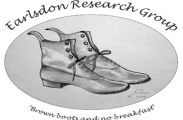The Earlsdon Research Group has the following members:
Peter James John Purcell
Helen Spence (Secretary) David Wagstaff
Peter Walters Peter Elias
Peter Thompson Bill Dunn
David Porter
The present Earlsdon Research Group has over time been known by three different names – the first being the Earlsdon History Group.
In the autumn of 1977, local research done by Graham Partridge, then branch librarian at Earlsdon Library, concluded that Earlsdon village began rising out of the fields in 1853, making 1978 its 125thanniversary year. He suggested that local people might be interested in organising an event the following summer to celebrate. This was the first Earlsdon Festival, known as the Earlsdon 125 Festival.
The Earlsdon 125 Festival was a huge success and after it had passed the history sub-committee, formed at that time, decided to continue their work leading to the birth of the Earlsdon History Group (EHG) in 1979. Avril Newey (then Avril Redman) volunteered to draw together a small group to research the background, building and development of the ‘village’ and to uncover as many personal memories and photographs as they could of the years since the 1850s.
Avril left Earlsdon in 1983 and the EHG was disbanded the following year, but not before valuable historical data, photographs and artifacts had begun to be rescued, catalogued and preserved.
In 1998 an exploratory meeting initiated by Mary Montes and others decided to set up a group that would hold a general brief for Earlsdon matters, with a particular interest in local history. Thus was born the Earlsdon Society, which held regular monthly meetings on matters local and historical and at the same time continued the work of researching, collating, preserving and exhibiting the history and on-going changes of the area.
Mary sadly died in 2007 and Avril, who had moved back to Earlsdon six years earlier, agreed to become the convener of the renamed Earlsdon Research Group.
While continuing its watching brief and exhibition presentations, the group now focuses on the task of making certain that Earlsdon’s historical records and artifacts, from street maps and directories to house and business deeds and plans and a photographic record covering 150 years, are preserved for posterity.
It is committed to maintaining local accessibility of those assets and to responding to public enquiries, ideas and suggestions for new ways in which it can continue to document the strong community that Earlsdon still is. As an example, the Earlsdon Research Group has responded to the Earlsdon Conservation Area Appraisal Report. To view this response, click on the following link Earlsdon Conservation Area Proposal.
